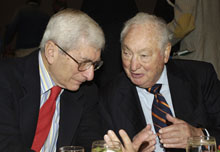Event
Shorenstein Center celebrates 20th anniversary

October 13–14, 2006 — How the media impacts politics and policy decision-making has been the subject of intense conjecture and debate for decades.
The Joan Shorenstein Center on the Press, Politics and Public Policy was founded in 1986 to address these very questions. Named for the late CBS Evening News producer Joan Shorenstein Barone and endowed with a substantial donation from Walter and Phyllis Shorenstein, the Shorenstein Center would become the first academic research center to focus exclusively on this unique nexus of policy and practice.
“It was a good idea whose time was right and everybody got behind it,” said Jonathan Moore, an early proponent of a Harvard center focused on the press and politics.
And as the Center marked its 20th anniversary with a two-day celebration in Cambridge, it remains very much at the forefront of research and discussion surrounding the contemporary challenges facing the media and their role in democratic societies.
“Globalization and the tensions between corporate objectives and journalistic ones, along with myriad developments in technology, are among an ever-evolving set of challenges confronting the news media today,” said Alex S. Jones, who has served as Center director since July 2000.
Jones’s predecessor Marvin Kalb, the longtime television news correspondent who is now a Senior Fellow based in Washington, believes the Shorenstein Center’s composition is what makes it such a unique place.
“What struck me from the very beginning was you had to have this mix of the scholar and the practitioner,” he said. “Without the scholar you couldn’t be taken seriously at Harvard. Without the practitioner, you don’t have the experience, the basis of knowledge, in which to place the scholarship.”
The unique mix of scholar and practitioner is perhaps best exemplified by the Shorenstein Center’s Fellows program, which brings seasoned journalists and scholars to Harvard for a semester-long research project. Other hallmarks of the Shorenstein Center include the Goldsmith Prize for Investigative Reporting, the annual Theodore H. White Lecture on Press and Politics, and an ambitious program of teaching, research and public programs.
Over 200 journalists and scholars, including many former fellows and visiting faculty, attended the center’s 20th-anniversary celebration. Talks and panel discussions focused on “The Future of News,” specifically the traditional news media, new media, and media and democracy.
This article was written by Doug Gavel of the Harvard Kennedy School. Photo by Martha Stewart.